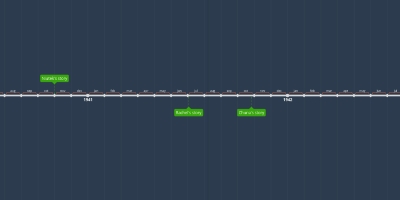1 jan 1942 ano - Rozia's Story
Descrição:
Since the Nazis invaded Poland, Rozia had lived in years of hide and seek. It wasn't a game, it was a life and death challenge. She didn't fully understand the reasons why she was hiding from the Germans. All she knew was that the Germans wanted her and her mother dead. In the Polish city of Kalisz, Rozia lived with her parents in an apartment decorated with custom-made furniture. Rozia felt like a princess. Her father, Jozef ran a profitable company that made shoes for women and children. Her mother, Sabina was a businesswoman who visited area shops, selling the shoes, and fabric from her own textile business. Rozia's life shattered when the Germans invaded Polandin September of 1939. Thousands fled the city including them. As they headed east on foot, German planes came down on them, thousands of machine gun rounds. She watched in horror as people and animals fell to the ground. A plan came low over the road, her uncle, Szy mek Langner grabbed her hand and threw her into a ditch shielding her with his body. After Poland surrendered weeks later, they returned back to their apartment. Nazis showed up at their door and demanded the family evacuate immediatly. They were taking over the apartment. Jozef took Rozia across town to her grandparents' apartment. 4 German soldiers burst into the apartment and say they have 20 minutes to pack what they can carry and meet at the marketplace. Rozia met up with her family as Nazis rummaged through all of the Jews' bags, taking anything of value. Most of Rozia's relatives were sent to the Polish city of Rzeszow. The Grossmans were shipped to Warsaw. In January 1940, the Grossmans got permission from Nazis to join their relatives in Rzeszow. They moved to a overcrowded house with dozens of strangers. The Nazis had destroyed most of the synagogues. Nazis made Orthodox Jews clean the streets on their hands and knees, ad soldiers would cut or pull of mens beards. Jozef was assigned to make boots for high- ranking Gestapo officers. Sabrina was put on a road crew that laid culverts. She cleaned the SS officers' club and returned home usually around midnight. Since Sabina worked outside the ghetto, she often sold other Jews' valuables and used the money to buy food for the people. In January 1942, the Nazis enclosed the Jewish neighborhood with barbed wire and divided it into 2 ghettos. The Germans started to limit the supply of food, medicine, and water. This led to starvation, disease, and caused hundreds of people to perish. Rozia had nowhere to go during the day so she went to work with her mom one day. They crossed into the Aryan side, Sabina pointed to a woman standing across the street and told her to walk slowly over to her. She led her to an apartment a few blocks away. She closed all the windows and lowered the shades. She told Rozia to stay in the bedroom and don't make a sound. Rozia wanted to go home. When the lady got back from work later that evening, she took her to a barbed wire fence bordering the ghetto and pushed her through an opening at the bottom. All mother and children had to go to Sammelplaatz in the morning, Sabina knew it was for execution so they had to go hide. A friend gave them fake Polish papers. Sabina went to meet Jozef for the last time. He couldn't go with them because he had no papers. In January 1943, Sabina and another women interviewed for a job as a live in house keeper for Adam Zak. Sabina got hired. Rozia moved from house to house and she sometimes didn't get to see her mother for weeks at a time and only for a few hours. Rozia was convinced Adolf Hitler wanted to personally kill her. In summer 1943, Rozia went to live with the Noways, a catholic couple who lied in an apartment above the stationery they owned in Warsaw. Rozia went to church with them so she could learn about their religion. rozia had to go live with another couple because Mr. Nowak was about to be arrested. It was a crushing disappointment for her because she felt very comfortable with them. It became too difficult for Sabina to find a safe place for Rozia. Mr. Zak thought of the idea to have Hanka, his daughter, act as Rozia' s older sister and live with a distant relative outside of Warsaw. They received a note saying, "You are keeping a Jew. Send her away immediately or we will expose her." rozia and Hanka hurriedly packed they things and ran away. They ran several miles to a phone where Hanka called her father and picked them up and brought them back to Warsaw. Sabina, Rozia, and Hanka left Warsaw and wandered from village to village for 4 months. They begged for food. In December 1944, Rozia and Hanka were in a house when they were caught in the middle of a deadly battle between German forces and red Army. After hours of fighting, footsteps approached the house. The door opened and it was a Russian soldier holding bottles of vodka. They had been liberated and were now free.
Adicionado na linha do tempo:

Survivors of the Holocaust
Data:
